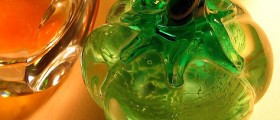
Composition and composers
When it comes to the “composers” of perfumes, i.e. the people whose role is to put the entire process of composing perfumes into action, their primary role is to create such perfumes that will capture peoples senses and thus ultimately find their place in many homes. In quite a number of cases, such perfume-experts are also called “the nose” due to their subtle and acute sense of smell, as well as the expertise when it comes to composing those most lavish smells and fragrances. As a matter of fact, the composer can freely be called an artist, for what he creates in the end is a “whole”, a complete sensory work of art. This is a person who has undergone extensive “training” involving the concepts of fragrance esthetics. In addition, such a person is also well capable of conveying those most abstract concepts and moods by way of their final “works of art” – perfumes.
In order to become a master “composer”, it is essential for a person to be in hold of extensive knowledge of a vast number of fragrance ingredients and array of most subtle smells, to round it all up. This enables one to acutely distinguish each and every separate ingredient of the fragrance in question, and not only that, but also when one is combined with numerous other ingredients as well.
Composing a work of art
What is important to know when it comes to perfume oils is that, in the greatest majority of cases, they are comprised of no less than tens and sometimes even hundreds of different ingredients. For a much better reference, all these ingredients can be divided into following categories:
Primary scents Modifiers Blenders FixativesToday, the process of perfume creation has altered slightly. What this means is that quiet often perfumes are no longer composed from the ground and up, but instead, fragrance bases are employed (i.e. essential oils and aromatic chemicals).
- www.nhs.uk/Services/careproviders/Overview/DefaultView.aspx?id=50335
- Photo courtesy of Eivind Lindseth by Flickr: www.flickr.com/photos/eivinds/3160186124

















Your thoughts on this
Loading...